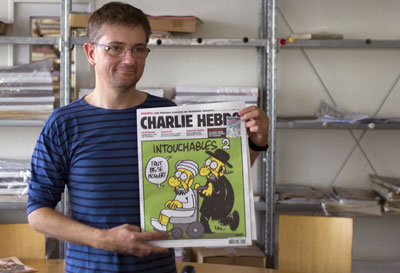Brussels, January 7, 2015–Heavily armed and hooded gunmen attacked the Paris office of the French satirical weekly Charlie Hebdo today, killing at least 12 people and injuring at least 11, in the worst attack on the media since the 2009 Maguindanao massacre in the Philippines.
“We are shocked and saddened by the horrific violence perpetrated against the weekly Charlie Hebdo–one of the deadliest media attacks ever documented by CPJ,” said CPJ Executive Director Joel Simon. “Around the world, journalists working in their own countries are targeted and killed because of what they publish or broadcast. An attack of this nature in Paris shows that the threat to journalists and free expression is global, with no safe haven.”
Paris prosecutor François Molins told reporters that two men wearing black balaclavas and armed with Kalashnikov machine guns entered the newsroom around 11:30 a.m., The Guardian reported. At the entrance, the attackers killed one person–whom Molins did not name–and proceeded to the second floor, where a Charlie Hebdo editorial meeting was taking place, reports said.
Molins said the attackers killed eight journalists, according to NBC. The Guardian reported that among the victims were Stephane Charbonnier, chief editor of the weekly, known as the cartoonist “Charb;” Bernard Maris, a shareholder, columnist, and deputy chief editor who wrote under the penname “Uncle Bernard;” and cartoonists Jean Cabut, known as Cabu; Georges Wolinski; and Bernard Verlhac, known as Tignous. French media reported that also killed were cartoonist Philippe Honoré, copy editor Mustapha Ourad, and Michel Renaud, who some reports said was guest editing the weekly. There was no immediate confirmation of the victims’ identities from official sources.
Following the attack, the killers fled to the street, where they shot and killed a police officer before getting away in a black Citroen car, reports said.
No organization immediately claimed responsibility for the attack. News reports cited witnesses as saying the gunmen shouted “Allah u Akbar” and referred to the Prophet Muhammad. Police launched an investigation, and Molins requested help from the public in identifying and apprehending the killers, according to news reports.
French police advised other media outlets to be on the alert, fearing other attacks. Metal shutters were down at the headquarters of the daily Le Monde.
The attack against Charlie Hebdo drew criticism around the globe from journalists, cartoonists, diplomats, and politicians, as well as local residents in France, reports said. Rallies were reported to be held in Paris and other French cities, and the social media hashtag #JeSuisCharlie was used to express solidarity.
Charlie Hebdo had been under threat from Islamic extremists and under police protection since the magazine was fire-bombed in 2011, a day after it published a caricature of the Prophet Muhammad and a spoof edition “guest edited” by the Prophet, according to news reports.
The attack occurred in a highly tense and politically volatile climate in a country confronted with the departure of hundreds of French citizens to fight with Islamic militants in Syria and Iraq; controversies around the place of Islam in French society; and the rise of the nationalist political party National Front, which topped the May 2014 elections to the European Parliament.
Charlie Hebdo‘s cover this week featured a cartoon on writer Michel Houellebecq, whose new book published the same day as the attack, Soumission (Submission), imagined the victory of a Muslim president by 2022 in France, according to news reports.
EDITOR’S NOTE: This alert has been updated with new details on the attack and the journalists killed.
